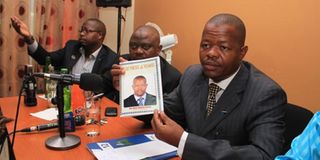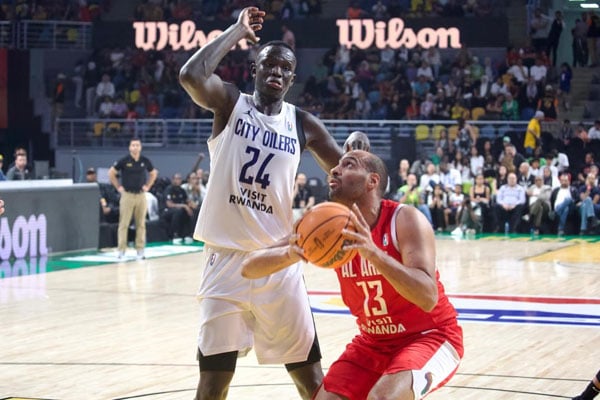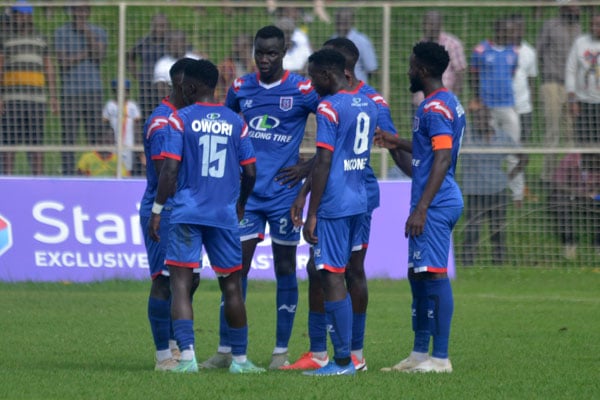Football tops 2013 sports scandals

Fufa president Moses Magogo (R), who took office after Lawrence Mulindwa opted not to seek re-election, has endured a torrid time in office. PHOTO BY JB SSENKUBUGE
What you need to know:
Not rosy. Fufa Super League and Uganda Super League (USL), Ministers Jessica Alupo, and Charles Bakkabulindi as well as Moses Magogo, Fufa Limited and Fufa the association, all made headlines in a year that was not devoid of scandals.
KAMPALA.
Just like last year, marathon super- star Stephen Kiprotich was the saving luminary of 2013. The Olympic and world champion lit where darkness graced and wiped tears where they lingered as Uganda endured another year hardly devoid of scandals. And yet again, football was there flexing its muscles for accolades among the trade’s dirtiest. We take a look at the scandals that have rocked the year.
1. The football mutiny:
Just when we thought 2013 would usher in a new dawn, a dawn of one unchallenged topflight league fully backed by sponsors, one widely embraced Fufa and its president, a decisive government decision on how sports associations should be instituted, we had one full year of more intrigue, more disorganisation and one that further pushed sponsors of the local league away.
Even after government ruled after several probes that there be one legal league, the savage football leaders could care less for as long as they scored a few marks over their rivals.
So never mind, the Fufa Super League (FSL), fathered by the acronym, and the Uganda Super League (USL) – who insist they are the bona fide runners of the competition, both did kick off, albeit the latter later halting and offering to trust government to come good on their promised course of action or chase their cause in courts of law.
As it stands, local football clubs continue to thrive in uncertainly – largely thanks to their naivety - with most not affording to pay their players. The whole scenario remains a spectacular act of pretence; pretence that all is perfect.
2. Government fail with the law
It all started with ultimatums dating way back to January 31, 2013 for Fufa and USL to have zeroed in on one league or they are forced into one. But a few months after January 31 and the stand-off swayed large.
So the line ministry took it upon itself and led a probe geared at having one league. Soon Education and Sports Minister Jessica Alupo, flanked by her junior minister for sports Charles Bakkabulindi, made a government pronouncement at the Media Centre which drastically divided opinion.
Fufa were happy with it while USL disregarded it, insisting that nothing carried sense if the status of Fufa Limited and Fufa the association was not resolved.
To that effect, Alupo and group formed a task -force to fast track a new Sports Policy and also sought legal interpretation from the Solicitor General, who confirmed Fufa went against the local laws in registering a national association as a limited company – and recommended its disbandment.
But reported intervention of the Prime Minister under the illusion that Uganda may beat Senegal and perhaps qualify for the 2014 World Cup saw action delayed. But from then on, government could not commit on record whether they recognised the two leagues or Moses Magogo’s new Fufa regime, as the Constitutional Court issued a temporary injunction stopping government bodies from dealing with Fufa Limited and its activities.
The situation has since remained uncertain, both at Fufa and USL, with government playing the ‘wait and see’ game. Now, the USL group is back in court – this time dragging Bakkabulindi and Magogo there, and this game might as well carry on into the World Cup year. But for this and the preceding years, government - just like the local football bodies - has undoubtedly been such a fail with the law.
3. Ministers clash
In one corner you had a Cabinet minister refusing to openly acknowledge the sitting Fufa regime and recognising any of the leagues that call themselves topflight competitions, that is until government officially pronounce themselves on the aforementioned.
On the other, you had the State Minister issuing supporting letters that the federation is the legal one, so is their league.
To date, the so called press conference at the Media Centre promised mid this year by the Senior Minister for government to pronounce themselves on the legality of Fufa and the way forward is still at large.
That promise was made in the open and government owes it to the public to come out on this.
4. Drivers ban
Motorsport is one of the more respected disciplines in the country, and one whose action leaves your adrenaline visible in your awed mouth. But that’s not to suggest all is rosy in its management.
Apart from not holding an awards ceremony for last year’s and this campaign’s champion Jas Mangat, the Federation of Motorsport Clubs of Uganda (FMU), has had its fair share in mismanagement.
The biggest controversy was six-year ban of four drivers - Duncan Mubiru, Nasser Mutebi, Geoffrey Nsamba and John Burrows early this year.
The three drivers were banned in July for allegedly sabotaging the sport when they criticised the track at Festino site and discouraged fans and other competitors from attending the CBS sprint in Lubiri.
They were also questioning the federation’s accountability of funds among other issues. But as if to exercise the true spirit of Madiba, the fallen African hero, the federation and the four drivers have settled their grievances out of court and are, therefore, a team once again.
5. Cricketers strike
A rather fruitful trip to the ICC World Cricket League Division III tournament in Bermuda in May, which earned Uganda a slot at next year’s ICC World Cup Qualifiers due in New Zealand and $175,000, spelt some good omens for the national men’s senior cricket team.
But having spent a month and half with no contracts renewed and consequently no pay, the players were bound to increasingly grow agitated unless the Uganda Cricket Association (UCA) acted.
The UCA did offer Shs400,000 per month with each of the 15 contracted players earning a performance bonus of Shs1.6m in a given month.
However, the players requested that the board breaks down the contract into classes of Shs600,000 (five players), Shs400,000 (six) and Shs200,000 (four) along with bonuses to garner up to Shs2 million, to which the latter couldn’t buy, prompting players to go on strike.
But the two parties, without making public concessions, later agreed to end the July stalemate and resumed training ahead of the gone-bad November ICC World Cup Qualifiers.




